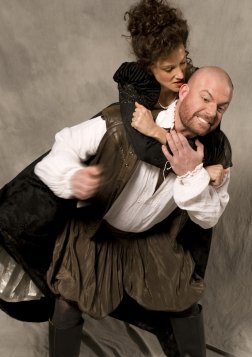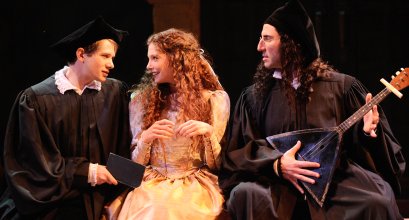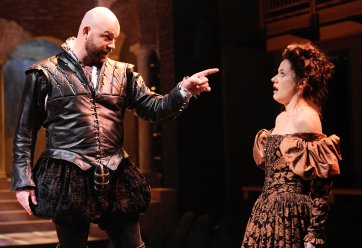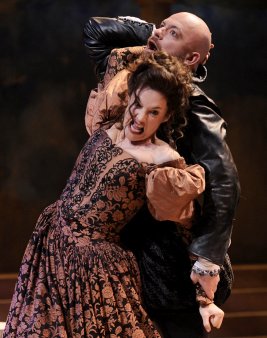Summary 
Uneven production juxtaposes Shakespeare's problematic comedy with newly written Induction scenes that detail the bitter end of a relationship between a modern version of the play's lesbian director and her fiery lead actress. Often vulgar and too often unconvincing, the new scenes pale considerably against the rambunctious enactment of Shakespeare's play. A hit-and-miss entertainment.
Design
Directed by Josie Rourke. New Induction scenes written by Neil LaBute. Design by Lucy Osborne. Lights by Philip Rosenberg. Sound and original music by Lindsay Jones. Fights by Matt Hawkins.

Cast
William Dick (Stage Manager), Mary Beth Fisher (Director), Ian Bedford (Petruchio), Bianca Amato (Katharina Minola), Katherine Cunningham (Bianca Minola), Sean Fortunato (Hortensio), Mike Nussbaum (Gremio), Erik Hellman (Lucentio), Brian Sills (Tranio), Larry Yando (Baptista Minola), Alex Goodrich (Biondello), Ross Lehman (Grumio), Matthew Sherbach (Curtis), Marc Grapey (Vincentio).
Analysis
Guest director Josie Rourke's The Taming of the Shrew features a world premiere modern Induction by playwright Neil LaBute to replace Shakespeare's Christopher Sly framing of the infamous story. Whereas Sly's perspective was that of a drunkard being entertained with an impromptu performance, perhaps dampening the latent disagreeability of a husband systematically crushing the will and spirit of his new wife, LaBute's contemporary framework cleverly centers upon a brash and outspoken lesbian actress preparing to play the Katharina role during technical and dress rehearsals of a new production of The Taming of the Shrew and verbally sparring with her lover, the play's director.

Rourke begins her production even before the audience takes their seats, showing a stage crew in black with headsets and clipboards setting up lighting and vacuuming the apparently newly-constructed set. The initial conceit impresses - an ultra-modern 2010 production of a notorious play about the crushing of a female spirit, perhaps directed by a manipulative female lover to both control and intimidate her lover, who stars as the ultimately tamed Kate. But the execution is frequently trite and simplistic, and the language, especially when juxtaposed against Shakespeare's poetry, is coarse and too often wincingly vulgar.

Mary Beth Fisher's Director struts around the stage in jeans, a sport coat, and a beret, far too much a butchy bitch stereotype than a complex and controlling woman in a realistically curdled relationship. She prods the cast through a rehearsal - they wear casual clothes, chat on cell phones, and appear bored - including a Bianca-like redheaded actress of course playing the superficial Bianca ("that's Jasmine, with two Js!") as a teeny bopper valley girl in tight red curls. When Fisher's unnamed Director breaks the rehearsal for lunch - the early Taming scenes far more fluid and funny and fun than the interruptive and flat new Induction - the two lovers battle it out themselves onstage. They sputter hackneyed phrases like "we can say adios to each other after this production" and "if you love me, you'll stay," and their forced dialogue is peppered with profanity - "oh shit" and "fuck you" - as well as horrible insults like faggot, whore, slut and psycho. The clichés and ugly dialogue render the characters unlikable, despite their obvious intelligence, and their histrionic free-for-all is witnessed by the entire cast, who are revealed eavesdropping upstage when the lights unexpectedly come up.

Kate's romantic combat with the Director - "don't fuck the help" - is a far cry from the splendidly-named Bianca Amato and her scenery-chewing star-turn as Shakespeare's Katharina. Amato, slender and lovely in an off-the-shoulder gown with her hair up in curls, becomes a snarling she-devil with nails bared, insulting Petruchio even as she bites at him and he pulls her by the hair. Theirs is true romantic conflict, Petruchio a strapping bald behemoth in a dark goatee, clad all in black and sparring with the sly confidence of a waggish pirate. The scenes play upon a multilevel set featuring an array of tall and multicolored louvered doors upstairs facing black ornamental wrought-iron railings and a spewing water fountain at stage center. Other characters are memorably physical, especially the pixieish Bianca and her impossibly-cute little snowball dog, live and yapping onstage, and the elderly Gremio limping about with an exaggerated codpiece like a velvet erection. Ian Bedford's brawny Petruchio finally seizes Amato's Kate, flinging her bodily over his shoulder, a spotlight coming to focus on her bottom as Fisher's Director halts the rehearsal, abruptly interrupting the continuity of the story.

The second act resumes with the Director's production being performed - apparently with great difficulty - on opening night, and she must herself address and apologize to the audience mid-way in a painfully awkward sequence that deflates the entire production. Fisher's Director confides to an increasingly uncomfortable audience about her romantic woes - "my relationship is over, by the way" - but the gratingly trite monologue is overstuffed with easy and corny lines like "it feels good to tell somebody" and "at least you have someone to go home to tonight." The supposedly comical confession flounders despite Fisher's best efforts - "I have so much to give!" - and veers into ugly insults ("capricious little twat") and then into painfully real self-reflection: "I'm dying out here, people!" Credit to Fisher for making her manipulative Director at least somewhat more complex and human, as she gives an ironic "thanks" to the "infidels" who have departed at intermission, and relates to the suffering audience, both real and imagined: "thanks for hanging out, or should I say, hanging on."

Rourke finally refocuses on Shakespeare's play, with a snarky Grumio and a swishingly effeminate Curtis watching Amato's Kate arrive in a muddy dress, her arms limp, looking tired and hungry, filthy, and nearly defeated. Grumio conceals himself from Petruchio's wrath - "this is a way to kill a wife with kindness" - by wrapping himself in upstage curtains while Bedford's Petruchio systematically breaks the psychological will of his new bride. During the wager scene post-wedding - Bianca strutting in a pink and white taffeta dress like a cherry vanilla explosion - Petruchio kisses Kate gently, the stage lit in autumnal shades of orange and tan and yellow and red, the brick of the walls exposed as cracked and crumbling beneath peeling plaster. Fisher's Director seems to imply that Kate's submission will lead directly into marital bliss as the couple enters the twilight of their lives. Amato's still-fiery Kate, clearly the strength of the production and buoyed by Bedford's manly pirate Petruchio, delivers her 5.2 speech with such earnest conviction that Petruchio's mouth gapes wide, and he kneels before her as she lies prone, her bare hand out for his boot to tread upon.
LaBute's Kate - quite unlike the headstrong wife broken onstage for Christopher Sly's amusement in Shakespeare's play - is a different character. Before Bedford's Petruchio can speak, Amato's contemporary and liberated actress leaps to her feet - "fuck this!" - adjusting her leggings beneath her skirt and storming off the stage in a jarring act of defiance against her director and the play itself, effectively concluding the play as well as the play-within-the-play. Perhaps with a more convincing Induction - more complex interaction, less crude dialogue - the conclusion would have carried additional weight and perhaps could have bordered on triumphant irony, but instead the conclusion plays like a mere pique of thumb-biting anger.